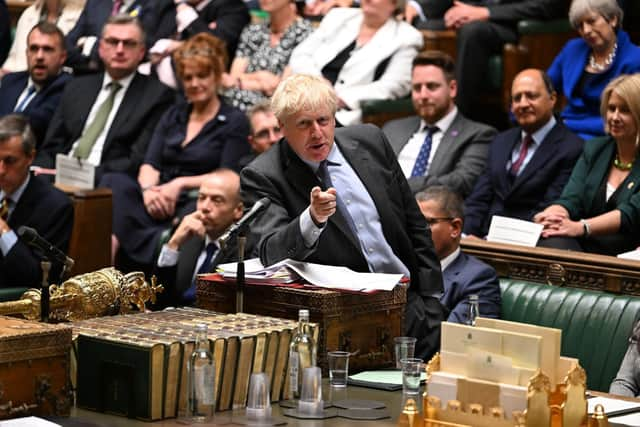Parliamentary Sovereignty means our own laws are final - Bill Carmichael
The question was simply: “Explain what is meant by Parliamentary Sovereignty”, and it formed part of the end of year exams I was marking for a politics module taken by university students.
The marking guide, not written by me incidentally, stated: “Candidates should explain that Parliamentary Sovereignty is the single most important principle of the UK constitution.
Advertisement
Hide AdAdvertisement
Hide AdParliament can make or unmake any law on any subject, and no one Parliament is bound by the decisions of its predecessors, nor can it bind its successors. There is no higher body that constrains the legal authority of Parliament.”


That was good enough for a pass, but the more diligent and able students also referenced the Glorious Revolution of 1688, when English parliamentarians overthrew the Catholic James II and invited his daughter, Mary, and her Dutch husband, William of Orange, to become the new monarchs.
The following year, the enactment of the English Bill of Rights, greatly influenced by the acclaimed Enlightenment philosopher John Locke, laid down strict limitations to the power of the monarch, along with the requirement for free elections, freedom of speech, the prohibition of cruel punishments, and the radical notion that taxes could not be raised without Parliament’s consent.
In a revolutionary move, it stated that in future the Crown must seek the consent of the people, through their representatives in Parliament.
Advertisement
Hide AdAdvertisement
Hide AdThat is why today, Her Majesty Queen Elizabeth, much as we love and admire her, reigns but does not rule. Her powers are largely symbolic. She reigns through our democratically elected Parliament and “Her Majesty’s Government” – in other words, it is the Prime Minister, Cabinet, and MPs where the real power resides.
The result, it has to be said, is a bit of a messy compromise, but it has served this country well, protecting our liberties and independence for well over 300 years.
And it is not only a foundational document of British democracy, but also of the precious liberties of the entire western world.
That English Bill in 1689 formed the basis of the US Bill of Rights a century later in 1789, and also the United Nations Declaration of Human Rights of 1948 and the European Convention on Human Rights of 1950.
Not for the first time England was, way ahead of our time.
Advertisement
Hide AdAdvertisement
Hide AdI’d marked over a hundred of these exam papers, and was feeling a little frazzled and was sipping on a long cold one to recover, when I switched on the radio to hear the Irish Foreign Minister, Simon Coveney, accusing the British government of “breaking the law” for attempting to re-write the Northern Irish protocol, part of the Brexit agreement.
I’m sorry Simon, but if you put that in an undergraduate essay, I would have no option but to give you a big F for fail.
Let me explain. The Irish Parliament, Dail Eireann, is no longer sovereign, and instead it has surrendered its independence to become a vassal state of the unelected, unaccountable bureaucracy that is the European Commission. That is absolutely fine, because apparently the Irish people are entirely happy with that decision – although I am sure that whirring sound you can hear is Wolfe Tone, James Connolly and Michael Collins, who fought for Irish independence for many years, spinning in their graves.
But since the UK left the EU in 2020, we, in contrast to the Irish, have regained our Parliamentary Sovereignty and we are now an independent self-governing nation once again. And the idea that our Parliament can break the law is nonsense – because Parliament is the law.
Advertisement
Hide AdAdvertisement
Hide AdWhat angered Mr Coveney so much was that this week the British Government introduced a Bill to change the way parts of the Protocol work.
The other big story this week was the grounding of a flight of migrants to Rwanda following the intervention of the European Court of Human Rights (which is not part of the EU).
It so happens that this government has pledged to introduce a new Bill of Rights, which will change the way the British courts interpret the rulings of the Strasbourg court.
There is no guarantee either Bill will be passed. They could be defeated in the Commons or held up in the Lords.
Advertisement
Hide AdAdvertisement
Hide AdBut if they are approved they become the law, and there is nothing Mr Coveney or anybody else can do about it.
That’s what Parliamentary Sovereignty means. As the marking guide has it: “There is no higher body that constrains the legal authority of Parliament.”